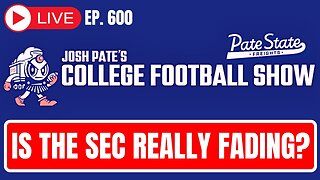Premium Only Content

FDA Says Ivermectin Doesn’t Work Against COVID-19
Locals = https://sweethomesa.locals.com/
POPULIST REVOLT = https://populistrevolt.com/
The U.S. Food and Drug Administration (FDA) says a drug called ivermectin does not work against COVID-19 but links to studies that show it does, an Epoch Times review has found.
The FDA’s website states, “Currently available data do not show ivermectin is effective against COVID-19.”
But half of the studies to which the FDA points support using ivermectin against COVID-19, according to the review.
The papers cut against the drug agency’s repeated exhortations for people not to take ivermectin for COVID-19. In Twitter posts, public statements, and emails, FDA officials have repeatedly warned against ivermectin. Some of those statements triggered a lawsuit from doctors who say the agency’s role is to approve drugs, not to issue recommendations. The suit was dismissed this week.
Dr. Pierre Kory, who frequently prescribes ivermectin for COVID-19 and co-authored a meta-analysis that concluded the drug is effective against the illness, told The Epoch Times that the government’s position on ivermectin “is one of the most glaring examples of the corruption of modern evidence based medicine.”
“There’s one message they want everyone to understand. And that message is that ivermectin doesn’t work,” Kory said. “That’s not a scientific conclusion, that’s theirs. That’s their perverted and distorted interpretation of the data.”
The FDA’s media office did not respond to a request for comment.
Dr. Janet Woodcock, a top official at the agency who was its commissioner from January 2021 to February 2022, told The Epoch Times via email that “ivermectin has been shown to be ineffective against COVID in large randomized trials.”
Studies
The FDA’s website points to a U.S. National Library of Medicine database of studies analyzing ivermectin against COVID-19. There are 88 studies listed in the database.
Out of studies that are listed, have been completed, and have results reported, most show or indicate ivermectin effectively combats or prevents COVID-19, according to the review by The Epoch Times.
They include papers reporting on results from randomized, controlled trials, which are often offered as the highest level of evidence by U.S. government officials. Such trials feature a group that receives a placebo and a group that receives the drug, randomization into groups, and blinding, or shielding operators and/or patients from the knowledge of which participants are receiving ivermectin.
Among the papers is a randomized, blinded, controlled trial that found people who received ivermectin and doxycycline, an antibiotic, recovered faster from COVID-19 than those who received a placebo.
Bangladeshi researchers reported the results from the trial of 363 participants on May 13, 2021, in the Journal of International Medical Research.
“Patients with mild-to-moderate COVID-19 infection treated with ivermectin plus doxycycline recovered earlier, were less likely to progress to more serious disease, and were more likely to be COVID-19 negative by RT-PCR on day 14,” they said. PCR has been used to test for COVID-19.
Another paper, published on July 7, 2022, in the International Journal of Infectious Diseases, found that that ivermectin decreased the level of COVID-19 and its viability. Israeli researchers in the randomized, controlled, open label trial compared 47 patients who received ivermectin against 42 who received placebos and said that “ivermectin significantly reduced the time of viral shedding and affected viral viability when initiated in the first week after evidence of infection.”
“There were lower viral loads and less viable cultures in the ivermectin group, which shows its anti-SARS-CoV-2 activity,” the researchers said. SARS-CoV-2 is a name for the virus that causes COVID-19.
A third paper concluded that a regimen of ivermectin and carrageenan works as a prophylaxis, or preventative medicine. Argentinian researchers found in the observational trial involving 229 health care workers that ivermectin helped prevent COVID-19 infection. A followup study involving nearly 1,200 workers confirmed the results. Both sets were reported in the Journal of Clinical and Biomedical Investigation on Nov. 17, 2020.
Ivermectin “could have saved so many lives,” Héctor Carvallo, one of the researchers, told The Epoch Times via email, adding that “it’s been a crime against mankind to prevent its prescription.”
Some other studies, including the largest ones, either found indications that ivermectin works against COVID-19 but did not achieve statistical significance or found no evidence that ivermectin is effective.
That includes a randomized, controlled, double-blind 2021 study by Mexican researchers that found ivermectin did not significantly impact hospitalization duration or mortality, and a randomized, controlled, double-blind 2022 trial by U.S. researchers that concluded ivermectin did not prevent hypoxemia, hospitalization, or death.
For instance, Spanish researchers reported in The Lancet in February 2021 that ivermectin did not have an impact on testing results, but that there was “a marked reduction” of self-reported symptoms such as loss of smell and cough, and lower levels of viral loads. The result “warrants assessment in larger trials,” the researchers said.
The remaining 10 studies returned results that did not favor ivermectin or did not achieve statistical significance.
U.S. researchers, for example, found that ivermectin probably worked better than a placebo, but that the results did not achieve statistical significance, prompting them to say in October that “this study adds to the growing evidence that there is not a clinically relevant treatment effect of ivermectin at this dose and duration.”
The FDA did not respond to a request for comment on the revelation that half of the studies it points to support using ivermectin (IVM) against COVID-19.
Woodcock, the FDA’s principal deputy commissioner, reviewed the studies. She was unimpressed.
The Bangladeshi trial, for instance, was criticized for primarily including young persons, and having a higher number of dropouts in the placebo arm. Woodcock said the Israeli study did not report “clinical outcomes” and noted many of the other papers had small numbers of participants.
“There are only a couple studies here that really look at the effects of IVM and see a positive clinical effect and they are much smaller than the negative studies,” Woodcock told The Epoch Times in an email.
The trials in favor of ivermectin are on the smaller side, and more likely to be observational. But that doesn’t necessarily mean they are inferior, Kory said. He cited research that found there was little difference between observational studies and randomized-controlled trials, as well as a paper that said “study design is only one factor that determines study quality.”
The FDA isn’t the only government group opposed to using ivermectin to treat COVID-19. The National Institutes of Health (NIH) COVID-19 Treatment Guidelines Panel recommends against it, citing several of the larger trials that found little or no benefit for ivermectin. The panel cites none of the papers that found a positive effect.
Criticism of Design
Many of those studies have been criticized over their design. One major factor, critics say, is participants not receiving ivermectin soon after a positive test or the start of symptoms.
In one trial, researchers acknowledged that more than 4 out of 10 participants did not receive the dosage level that was listed as the “goal dose.” Further, the median time from the start of symptoms to treatment was six days, and the treatment duration was just three days. The trial, called ACTIV-6, was backed by the NIH.
The corresponding author for the trial did not return a request for comment. The authors said that “there was no evidence of a differential treatment effect based on the median time of symptom onset to receipt of study drug.”
In another trial that reported little difference between the treatment and control groups, the treatment group received ivermectin days after starting to show symptoms.
Ivermectin works best when applied within 24 hours of symptom manifestation, according to a meta regression of ivermectin studies performed by by an unnamed group of researchers.
“They literally try to treat as late into the disease as they can, for a short duration as they can, at the lowest dose that they can. And they also try to find as healthy and mild patients as you can,” Kory said.
“And yet, when they conduct those kinds of trials, it’s on the front page of a high-impact journal and the conclusion states, ‘this shows there’s no role for ivermectin in treatments.’ Absolutely absurd. And so it’s it’s really just corruption of these trials.”
-
 2:03:30
2:03:30
Nerdrotic
5 hours ago $2.31 earnedMysteries of Egypt with The Brothers of the Serpent | Forbidden Frontier #087
30.5K2 -
 2:29:27
2:29:27
vivafrei
13 hours agoEp. 245: Los Angeles ON FIRE! Gavin Newsom FOR JAIL? Trump SENTENCED! Pardons & MORE! VIva & Barnes
149K209 -
 LIVE
LIVE
Nobodies Live
4 hours ago $0.41 earnedNobodiesLive - Rumble Music TEST STREAM 2.0
482 watching -
 3:40:10
3:40:10
EricJohnPizzaArtist
3 hours agoAwesome Sauce PIZZA ART LIVE Ep. #30: Classic Gaming!
18.3K5 -
 1:18:42
1:18:42
Josh Pate's College Football Show
5 hours ago $0.31 earnedSEC Dominance Over | National Title Thoughts | Miami QB & DC Moves | Wrong About the Playoff?
21.9K3 -
 LIVE
LIVE
Vigilant News Network
9 hours agoIvermectin & Fenbendazole Cancer Secrets Revealed w/ Dr. William Makis | Media Blackout
1,609 watching -
 4:17:11
4:17:11
GamerGril
8 hours agoPRACTICE THOSE DROP KICKS | DEAD ISLAND 2
58.5K5 -
![Super Smash Bros Ultimate - Adventure Mode [Part 2]](https://1a-1791.com/video/fwe2/d9/s8/1/B/p/i/F/BpiFw.0kob-small-Super-Smash-Bros-Ultimate-A.jpg) 6:06:11
6:06:11
JdaDelete
11 hours ago $0.90 earnedSuper Smash Bros Ultimate - Adventure Mode [Part 2]
70.9K3 -
 3:53:21
3:53:21
GlizzyPrinceChristian
23 hours agoThis Game Literally is a Master Piece of Terrible Acting But the Combat is Good
70.1K -
 5:54:33
5:54:33
ttvglamourx
10 hours ago $5.09 earnedSUB SUNDAY !DISCORD
64.7K7